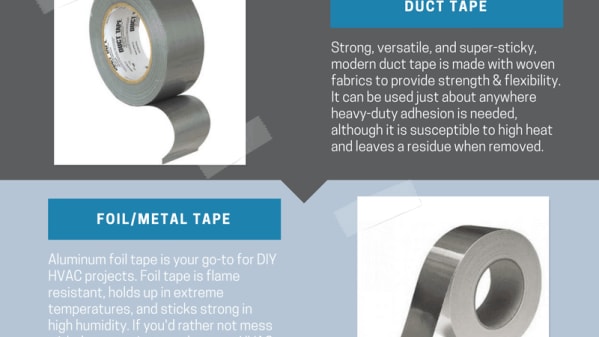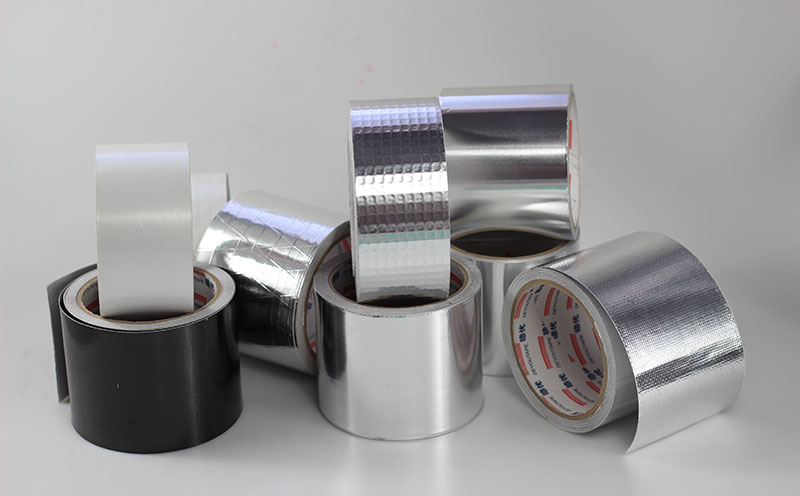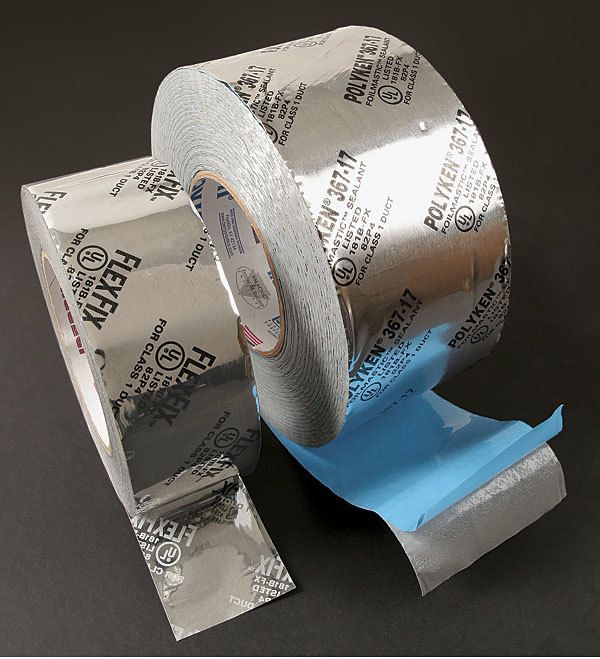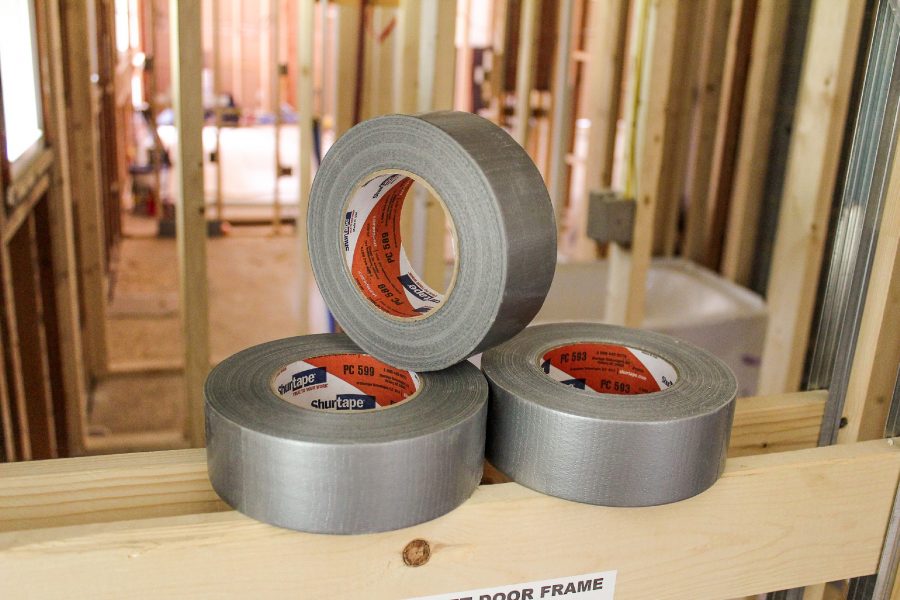HVAC tape is specifically designed for sealing heating, ventilation, and air conditioning systems, while duct tape is a general-purpose tape. HVAC tape is heat-resistant and durable, making it ideal for HVAC applications.
On the other hand, duct tape is versatile but may not withstand extreme temperatures or HVAC conditions. When choosing between the two, it’s important to consider the specific needs of your project to ensure a secure and long-lasting seal. In this blog post, we will explore the differences between HVAC tape and duct tape to help you make an informed decision for your sealing requirements.
Introduction To Hvac And Duct Tapes
Adhesive tapes are used in various settings, including home and industrial environments. When it comes to HVAC and duct tapes, it is essential to consider their adhesive properties, tensile strength, and durability. HVAC tapes are specifically designed for use in heating, ventilation, and air conditioning systems, while duct tapes are versatile and can be used for a wide range of applications.
The essential features of adhesive tapes include their ability to stick to different surfaces, resist moisture and temperature changes, and withstand wear and tear. HVAC tapes have superior bonding strength and can withstand high temperatures, making them ideal for sealing air ducts and pipes. On the other hand, duct tapes are strong and durable and can be used for general-purpose applications such as packaging, bundling, and labeling.
| Common Uses of HVAC Tapes | Common Uses of Duct Tapes |
|---|---|
| Sealing air ducts and pipes | General-purpose applications |
| Insulating HVAC components | Temporary repairs |
| Protecting against moisture and air leaks | Securing carpets and rugs |
Composition And Material Differences
HVAC tape and duct tape differ in their composition and materials. The adhesive technology used in HVAC tape is specifically designed for air ducts. It creates airtight seals that prevent air leaks and energy loss. The backing material of HVAC tape is generally made of aluminum foil or flexible film, which is heat and moisture resistant. On the other hand, duct tape is designed for general-purpose use and may not be suitable for HVAC systems. Its adhesive is not specifically engineered for air ducts, and its backing material is typically cloth or polyethylene. Understanding these differences is crucial for selecting the right tape for HVAC applications, ensuring optimal performance and efficiency.
Performance Under Stress
In the world of HVAC, there is often confusion between HVAC tape and duct tape. Let’s explore the differences and benefits of each.
When it comes to performance under stress, HVAC tape shines. It is specifically designed to withstand extreme temperatures, making it ideal for HVAC systems. With high-temperature endurance, it ensures a secure seal even in challenging conditions.
On the other hand, duct tape may struggle to maintain its adhesive properties in high heat or cold, potentially leading to leaks and inefficiencies. This highlights the importance of using the right tape for the job.
When considering durability and lifespan, HVAC tape proves superior. Its specialized construction and adhesive formula offer long-lasting performance, ensuring a tight seal over time. Duct tape, while versatile, may deteriorate more quickly, resulting in the need for frequent replacements.
Remember, choosing the right tape can greatly impact the efficiency and effectiveness of your HVAC system. Opting for HVAC tape ensures reliable performance and peace of mind.

Compliance With Industry Standards
When choosing between HVAC tape and duct tape, it is crucial to consider compliance with industry standards. Both types of tape must meet regulatory requirements to ensure the safety and efficiency of HVAC systems. HVAC tape is specifically designed to adhere to industry standards for heating, ventilation, and air conditioning applications. It is essential to use tape that complies with these standards to prevent air leaks and ensure optimal system performance. Duct tape, while versatile, may not meet the necessary requirements for HVAC installations and repairs, potentially compromising safety and efficiency.
Ease Of Application And Use
Hvac tape offers easy application and use, specifically designed for sealing and insulating heating, ventilation, and air conditioning systems. In contrast, duct tape, while versatile, may not provide the same level of durability and heat resistance needed for HVAC applications.
| HVAC Tape | Duct Tape |
| Designed specifically for heating, ventilation, and air conditioning systems. | General-purpose tape not designed for HVAC systems. |
| Resistant to temperature changes and works well in various weather conditions. | May degrade over time due to temperature fluctuations. |
| Creates airtight seals and helps prevent energy loss. | May not provide a reliable airtight seal in HVAC applications. |
| Ideal for sealing joints, seams, and connections in HVAC systems. | Often used for temporary repairs and non-HVAC related tasks. |

Cost Implications
The cost implications of HVAC tape versus duct tape can impact your budget significantly. HVAC tape is specifically designed for sealing and insulating heating, ventilation, and air conditioning systems, which may result in higher initial costs compared to duct tape.
However, using HVAC tape can lead to long-term savings by preventing energy loss and reducing the need for frequent repairs.
| Initial Investment | Long-Term Savings |
| HVAC tape is more expensive upfront than duct tape. | Saves money over time due to durability and effectiveness. |
Environmental And Health Considerations
Considering the environmental and health considerations, it is important to understand the difference between HVAC tape and duct tape. HVAC tape is specifically designed for sealing and insulating air ducts, ensuring better air quality and energy efficiency. On the other hand, duct tape is not suitable for HVAC applications, as it may release harmful chemicals when exposed to heat.
| Environmental and Health Considerations |
| Subheading: Eco-Friendly Options |
| Air Quality Impact |

Case Studies
In a comprehensive case study comparing HVAC tape and duct tape, we analyze their performance in various temperature and pressure conditions. The study presents real-world scenarios, providing valuable insights into the effectiveness and durability of both types of tape in HVAC applications.
| Residential Applications | Commercial Scenarios |
| HVAC tape is specifically designed for sealing air ducts in homes. | Duct tape may work for temporary fixes, but HVAC tape is more durable. |
| Studies have shown HVAC tape outperforms duct tape in residential settings. | Commercial HVAC systems benefit from the strength of HVAC tape. |
Expert Opinions And Recommendations
| Expert Opinions and Recommendations |
| Insights from HVAC Professionals |
Best Practices for Tape Selection: HVAC tape is designed for temperature variations and durability. Duct tape lacks these qualities, risking failure in HVAC systems. Choose HVAC tape for long-term, reliable performance. It ensures proper sealing and insulation, critical for HVAC efficiency. Investing in quality HVAC tape saves time and money in the long run. Consult HVAC experts for tape recommendations based on specific needs and applications. Prioritize using HVAC tape over duct tape for optimal HVAC system functionality.
Frequently Asked Questions
What Is Hvac Tape Used For?
HVAC tape is specifically designed for sealing and joining HVAC ducts, vents and pipes. It is used to prevent air leaks and to maintain the efficiency of heating and cooling systems. HVAC tape can withstand high temperatures and is resistant to moisture, chemicals, and UV rays.
Can Duct Tape Be Used On Hvac Systems?
While duct tape may be a quick fix for sealing minor leaks, it is not recommended for use on HVAC systems. Duct tape may deteriorate over time, causing air leaks and reducing the efficiency of the system. HVAC tape is specifically designed for this purpose and should be used instead.
What Is The Difference Between Hvac Tape And Duct Tape?
The main difference between HVAC tape and duct tape is the adhesive used. HVAC tape uses a specially formulated adhesive that can withstand high temperatures and is resistant to moisture, chemicals, and UV rays. Duct tape, on the other hand, uses a rubber-based adhesive that may deteriorate over time and is not suitable for use on HVAC systems.
Is Hvac Tape Waterproof?
Yes, HVAC tape is waterproof and resistant to moisture. It is designed to withstand the harsh conditions of HVAC systems and maintain a strong seal even in damp or humid environments.
Conclusion
Ultimately, when comparing HVAC tape to duct tape, it becomes clear that HVAC tape is the superior choice for sealing and insulating air ducts. Its specialized design and adhesive properties ensure a tight and long-lasting seal, preventing air leaks and optimizing energy efficiency.
While duct tape may offer temporary solutions, it is not specifically designed for HVAC applications and may deteriorate over time. By investing in HVAC tape, you can ensure the effectiveness and longevity of your ductwork, leading to improved indoor air quality and reduced energy costs.

